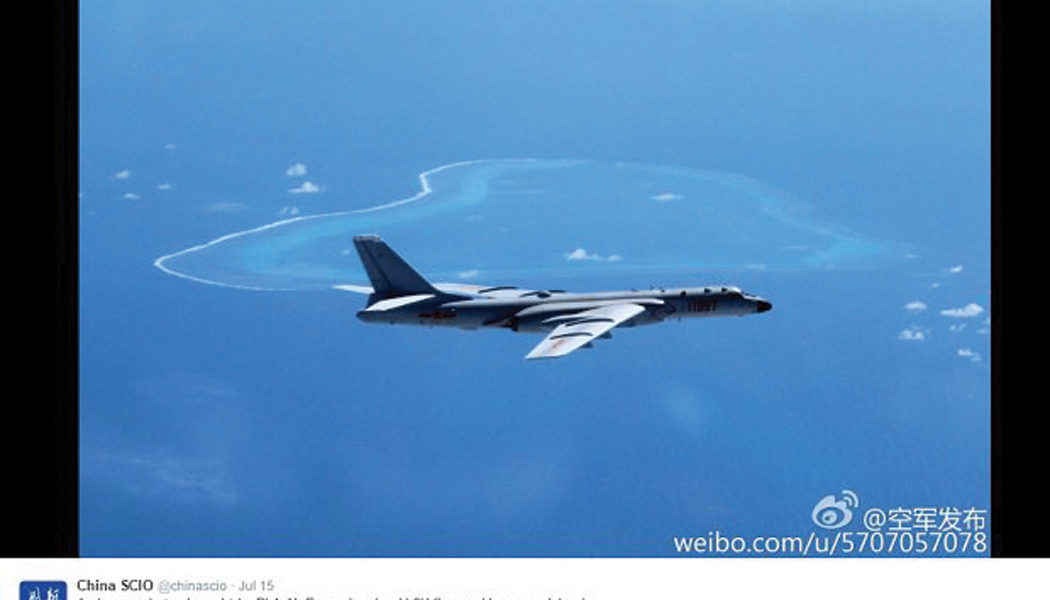The Philippines has “serious concern” over the Chinese bomber planes that landed on an island along the disputed South China Sea, said the country’s presidential spokesman. He added that the Philippines’ foreign ministry had taken “appropriate diplomatic action” but did not give specifics.
The statements come after the Chinese air force landed long-range bombers on a South China Sea island for the first time last week as part of what its officials said was a training exercise.
Harry Roque, Philippine President Rodrigo Duterte’s spokesman, said that the Philippines did not have independent verification on whether or not Chinese bombers were present in the South China Sea.
“But we take note of the reports that appeared and we express our serious concerns anew on its impact to efforts to maintain peace and stability in the region,” Roque added during a media briefing at Malacañang Palace, Monday, May 21.
“We view it with very serious concern,” he added.
The Philippine’s Department of Foreign Affairs (DFA) said it was watching the situation closely.
“We are taking the appropriate diplomatic action necessary to protect our claims and will continue to do so in the future,” the department said in a statement on the matter.
The Pentagon criticized China’s move, describing it as “continued militarization” of island positions in the disputed area.
“The United States remains committed to a free and open Indo-Pacific,” Pentagon spokesman Colonel Christopher Logan told Reuters.
“We have seen these same reports and China’s continued militarization of disputed features in the South China Sea only serves to raise tensions and destabilize the region,” he added.
China maintained that it was part of a military routine, and told other countries not to over-interpret its moves.
“We hope that relevant parties do not read too much into this,” said Lu Kang, foreign ministry spokesman of China.
“The relevant exercise is just a regular exercise of the Chinese military. There is no need to over interpret it,” he said.
Vietnam — also having claims to the area — added to the criticism.
The recent flights “increase tensions, cause regional instabilities and are not good for maintaining a peaceful, stable and cooperative environment in the East Sea,” said Vietnam’s foreign ministry spokeswoman Le Thi Thu Hang, in a statement.
The China H-6K bomber was reported to have landed on what was identified as Woody Island late last week — a location that the Washington-based Asia Maritime Transparency Initiative said would put all of South East Asia within the bomber’s range.
Both the Philippines and China have for decades claimed ownership of almost all of the South China Sea. Roughly $3 trillion worth of goods is believed to pass through each year. Other countries also having claims to the area are Brunei, Malaysia, Taiwan, and Vietnam.
China has already situated seven artificial islands in the region’s Spratly Islands to act as military outposts.
In claiming ownership, China has said its outposts — like the recent bombers — are strictly for defense purposes.
‘Cannot go into battle’
Duterte on Tuesday, May 22, gave his comments on the situation and said that while he wants to defend the country’s claims to the South China Sea, he is wary of worsening the situation.
“I cannot afford at this time to go to war,” said Duterte at the Coconut Palace in Pasay City during the Philippine Navy’s 120th anniversary. “I cannot go into a battle which I cannot win and would only result in destruction for our armed forces. I really want to do something to assert [our rights].”
He added, “In my own estimation, it would be a great loss to the nation and probably we will end up losing a war. All these things, I want to be made known to you. Whether you accept it or not, that’s the reality on the ground.”
Duterte has received much criticism for his inconsistent strategy in dealing with the dispute, starting back when he pulled out of a 2016 arbitration ruling by the Hague-based Permanent Court of Arbitration (PCA) that went in favor of the Philippines’ rights to the area.
Former Philippine foreign minister Albert del Rosario, has since been urging the president and his administration to reconsider the country’s foreign policies.
Speaking on the China bombers, Rosario continued his urges, adding a reminder that the Philippine Constitution “mandates our president to defend what is lawfully ours.”
He further added that in 2016, a Pulse Asia survey indicated that more than 8 in 10 Filipinos agreed on asserting the rights awarded by the arbitral tribunal.
Encouraging Filipinos to help Duterte and the government, Rosario said, “Our government needs to listen to its people. Our northern neighbor needs to listen to the Filipino people. And finally, all our traditional partners and friends — who are waiting for a united voice — need to hear from us.”
“Let us, therefore, respectfully convey to our President that we eagerly await his inspirational leadership by doing what is right,” he added.
China’s militarization moves are said to be included in the upcoming Bilateral Consultation Mechanism (BCM), a biannual meeting between China and Philippine officials on the maritime dispute concerns.
The first BCM was held a year ago in May 2017, and the second last February. The next is slated for June.





